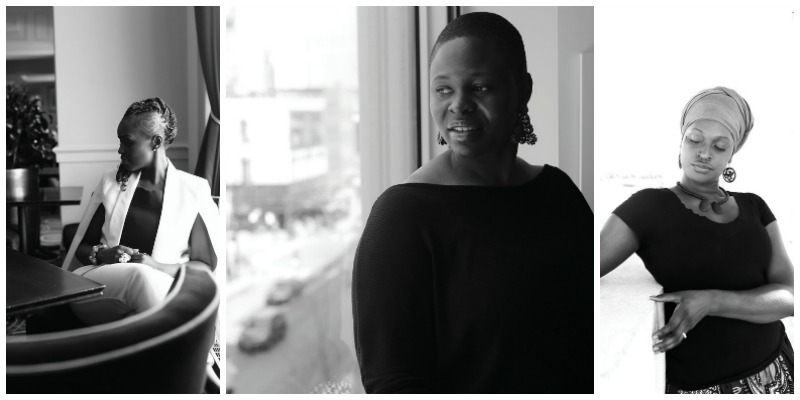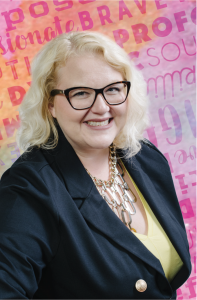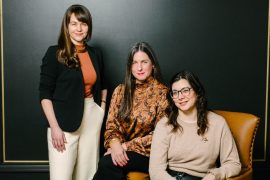IN THEIR OWN WORDS
Author Sagashus Levingston, in her debut book “Infamous Mothers,” due out in May, celebrates strong women who have triumphed—and now thrive, with impact—not despite, but because of their challenging pasts. She shares an excerpt here and the stories of two Madison women.
INFAMOUS MOTHERS
“INFAMOUS MOTHERS” is a response to a need. As a graduate student, I took a class on global feminism. It was the first class I had ever taken that was fully dedicated to feminism of any kind. I fell in love with it. Giving me the language and context to understand some of my experiences as a woman, it empowered me. Yet, almost as soon as it made me feel visible, feminism had erased me.
While the literature and theory had given voice to the struggles of so many women around the world, women from all kinds of backgrounds, I noticed that women like me were absent from this global stage. I am a single mother with six children by four different dads. I am poor, black—but I am also an entrepreneur who also is completing a Ph.D. Where was the voice of women like me in the literature?
Equally important, on the pages of articles and books throughout the discipline, where were we imagined as people who made a positive impact in the public sphere? We were either the charity cases people were trying to save or the social pathogens that institutions were trying to correct and, in some cases, eradicate. Always at one extreme or the other, rarely were we depicted with complexity. Why? In part because seldom have we been able to tell our own stories. “Infamous Mothers” is my attempt to address this gap.
In it are the stories of 20 women. All of them are, in one way or another, mothering from the fringes of our society. They were teen mothers, sex workers, drug abusers or baby mamas. Some have been abused by men, others abused by their own fears. All of them are black. At the same time, they are all women who have lived through circumstances they were never meant to survive. More than this, they are making a difference in our world as doulas, business owners, family advocates, artists and more.
This work is important. It gives complexity and depth to some of the stock stories heard about black mothers in the media and popular culture. It also provides two pieces of the story that the news and TV dramas rarely share: the narrative of these women’s triumph and how these mothers make a difference today. The best part is that these women are telling their own stories in their own words using their own voices. Their tales are as eloquent as they are raw. Not only will they will challenge everything you thought you knew about an infamous mother, their testimonies will make you question what you thought you knew about yourself.
–Sagashus Levingston, founder of Infamous Mothers
TAMARA THOMPSON-MOORE
FROM DISEMPOWERED AND DISRESPECTED MOTHER TO PROACTIVE LACTATION CONSULTANT AND BIRTH ADVOCATE
When I go places in public I always notice how people count my children for me.
“Wow, you’ve sure got your hands full.” People think that’s the thing to say to a mother of multiple children, but it really is offensive. When I tell people how many, they’re shocked. They say “you don’t look like you have five kids.” Really what they’re saying is “I had an image of what a mother of five kids would look like, and you don’t fit that.”
Depending on what kind of mood I’m in, I’ll say, “Well, now you can reset what you think mothers of five children look like. Here I am. Nice to meet you.”
I live in a community that some would say is homogenous— mostly upper-middle-class Caucasian. And here I am, with my dark-skinned self and my headwraps on, with my ‘afrocentricity,’ and people don’t know how to receive me. They’ll say things like, “you’re so well-spoken.”
When I first became pregnant I was working at a flower shop and a grocery store. I was like “Oh my God, I’m pregnant!” I had just gotten married. I was 20 years old.
Because I was part-time or I didn’t meet the 40-hour per week requirement, I enrolled in medical assistance. In Illinois, the way it works is, you’re told that now you go to the county health place. I didn’t have a lot of information—you know, what to do, where to go, how to navigate through the hierarchy of ‘here is your provider’ and ‘here is your OB-GYN.’
I had hyperemesis. It’s like morning sickness that isn’t just morning sickness, it’s all the time.
I was watching cable and I saw this show called “A Baby Story.” I would see these mothers have these beautiful birth experiences. But I was so disconnected from that because the county healthcare was so substandard. You feel like sardines coz you’re packed in a room where there’s 100 people and then the way that they talk to you when you come to get the services is like you’re a number.
They tell you where your birth is going to happen, and then the provider you get is the provider you get. I wasn’t comfortable with my provider being a male; but there weren’t any other options. I didn’t want to talk to him about my past, that I had sexual trauma. I didn’t want talk to him about why I don’t trust him.
So in the birthing process when Jocelyn was being born, he gave me an episiotomy that I didn’t need. An episiotomy is a laceration to the perineum—the area between the vaginal opening and the anus. He gave me a fourth-degree one, which means from one to the other. So one hole connects to the other hole, one opening.
There was no informed consent. They didn’t tell me what was going to happen, why they needed to do it. I was tearing, this is what was explained to me afterward. And so to facilitate the baby’s head coming out, he cut me. He did it so fast, my mother was upset, my husband was upset, everybody was upset.
Jocelyn was born at 4:05 p.m. They had to give me sutures. The nurses were pushing on my stomach, I’m trying to start breast feeding, she went across the room, they…all these things were happening that got into the way of what I thought was a beautiful ideal birth.
I felt so disempowered and victimized, and I felt like a number, like cattle that had like a tag on their ear with a number on it, you know. She doesn’t have a name, she’s number 52 in the herd. She’s just here to consume services that we’re going to give her how we see fit. She’s not here to ask us for what she wants.
I remember my very first post-partum visit. He said “what about birth control?” And I said “no, no thank you I don’t want any right now.” He said, “you will get pregnant again.” He said it like, like I was a, a breeder, like “if you don’t get this birth control you’re gonna get pregnant again,” like “we need to stop that at all costs.”
Now here I am: a married woman, an employed woman. My husband is employed. We live in the Southwest suburbs of Chicago. Our apartment was almost $1,000 for a one bedroom. But because I have this quote, unquote “insurance” I needed to be guarded when I tell people that I am happy about giving birth and building a family. I had to validate that to other people, because of my lack of income. And I thought, I should do something about that.
[Today] I’m a lactation counselor and I notice that having that title gets a certain amount of recognition in the medical field. Being a doula does not, however. Doulas are seen as these hocuspocus kind of folks that don’t really get the same respect that lactation counselors do because there’s all of this science that backs up breastfeeding and lactation. So I can go through the front door of the hospital, right. Being a doula, there’s nothing medical happening here. So I have to kind of go to the back door.But I’m operating in an ancient kind of wisdom. If I stand next to a woman who’s going through something big, you know, it’s a big, significant part of her life. And I say kind words to her— how simple is it to say kind words to someone?—she will have a better outcome than a woman who is in the room by herself going through the same thing. There are all these studies that will show that if I stand next to someone and I say “You can do it, you’re beautiful, you got this, keep going,” she’s gonna have a better outcome. I mean, do we really need science to back that up?
I operate in an ancient kind of wisdom that says birth is natural; that birth is something that the human body is already equipped to do. We have socially disempowered people in a way to where now there’s a need for a doula to teach people to trust their own natural instincts.
I think my super power might possibly be, being able to connect with people on an emotional level and being able to read emotions and to respond to those. I think that’s something that people describe in me.
I can bring calm.
ANGELA FERGUSON
FROM TEEN MOM TO CHILD CARE PROVIDER AND CEO HELPING CHILDREN AND FAMILIES THRIVE
I had my first son a month before my 18th birthday and then I had another one three years after that, another one three years after that, and another child three years after that. All my kids are three years apart. My oldest now is 25. My next one is 22. I have a 19 year old and a 16 year old.
My parents didn’t find out until my eighth month of pregnancy that I was pregnant because I was the normal teenager—I’d come home and I’d go in my room. You know, walk past them—“You want to watch a movie with us?”
“No, I’m okay.” I’d go in my room, and I’d hide it.
One day, my mom was in the kitchen, and I was hungry. My mom was on the phone talking to her sister—her normal routine—and I opened up the refrigerator, and she got a side glance of me from the sweater I had on, and that’s when we had that talk.
The guy I was pregnant by had already cheated on me twice, and I didn’t know how to tell them that.
But I got a lot of support from my parents. When I wanted to quit, my mother was right there. I had my grandmother talking to me like “this is not the end for you.” They didn’t enable me. They were just like “this is not the end. This is the decision that you made. Now here’s what you’re going to have to do.”
They didn’t allow me to lay in that bed in a depression. I had to get up and do what I had to do. At first I decided I wanted to do hair. Then I decided I wanted to be a CNA. I didn’t plan on being a child care provider in a daycare center. It happened that way. I took my kids to a daycare center that I could not afford. The bill got too high, so I ended up taking them to a home daycare. When I got to the home daycare I saw things that I didn’t like. That’s when I decided that I would just go and do daycare and watch my own kids. I enrolled at MATC and took the introductory class to childcare.
I started doing at-home daycare. My waiting list kept growing and growing. By word of mouth. Not by advertising on Facebook, Instagram. None of that. It was just all word of mouth, what parents saw.
I decided that I was going to go out and get a center. And I’m like, “Ma”—because my mom was my backbone—“help me find this place.” My parents had moved to Madison. When they found out that I was getting a divorce they sold their house and they moved to Madison to support me.
My dad instilled in us the importance of working. Like yard work. We knew how to keep our house clean. When I was younger we didn’t have much but the house was clean.
We started looking online for different places and talking to different realtors. Couldn’t really find anything.
This used to be St. Vincent de Paul. I remember looking through the window and writing down the guy’s phone number and I said, “Well, how much is this place?” And he threw these huge numbers out here. I was like, “Oh, I can’t afford that.” So then I called him again 30 days later, like, “Hey, I still see that this building is for lease. Like how much is it?” Threw these long numbers out there again so I thanked him for his time.
I came back again. I said, “Hey, Larry, it’s Angela”—by that time we were on a first-name basis. I’m like, “So how much is this place?” He asked me did I have a business plan, and I told him yes. And he asked me if I had a budget. I told him I didn’t have one but I would get one.
He set up a meeting with me. I had a whole portfolio of photos from when I first started to have kids. And letters of reference. And then I showed him my waiting list. He was like, “Well, can you afford this?”
I was like, “Oh no, that’s too high.”
“Can you afford this?”
“No, that’s too high.”
But then he was like, “Well how much can you afford?” And when I told him he said, “Okay.”
By the grace of God he just saw something in me and decided to support me. And during the next two years I decided that if he had that much faith in me that I was going to do the same thing for him and this building. I had sliding doors put in, a bathroom installed. I had walls built separating the classrooms, Plexiglas windows put in, the kitchen remodeled. I felt that if he could put that faith in me, I could do the same thing for him.
I’ve come from this skinny girl from the ’hood who had problems just like everybody else, but I decided that I wanted more.
I wanted more.
Editors’ note: Excerpted with permission. To learn more about Infamous Mothers, the business and the movement and to purchase the forthcoming book, visit infamousmothers.com.
Hear author Sagashus Levingston speak at BRAVA’s THRIVE Conference Woman to Watch Power Happy Hour.




